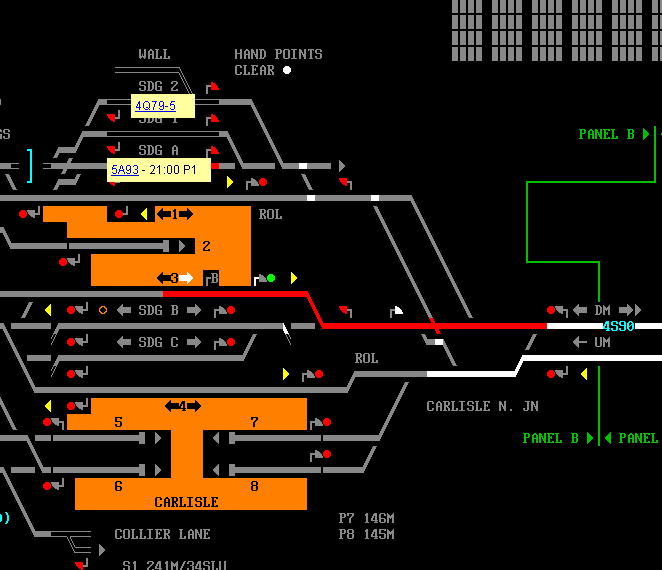Page 1 of 1
| CE323 Lit for Too Long? 06/01/2013 at 18:44 #40269 | |
|
Gwasanaethau
509 posts |
Hi all. I want to report a potential bug that does not seem to have been reported yet. I have just had a train leave platform 3 at Carlisle towards Scotland, which passed signal CE323 in the process. As the train passed the points and crossovers north of the station, the signal CE323 remained green. Is this a bug? A screenshot is provided.  There also seems to be a similar problem with signal CE286 (Down Main signal approaching Carlisle) when setting a route towards platforms 5 and 6. Unfortunately I do not have a screenshot of this as yet. I just wanted to take this opportunity to thank the developers and testers of the Carlisle sim. It is thoroughly engaging! I cannot stop playing it! Gwasanaethau (Mark) Post has attachments. Log in to view them. Log in to reply |
| CE323 Lit for Too Long? 06/01/2013 at 18:50 #40272 | |
|
BoxBoyKit
166 posts |
Suspect the signal may be last axle replacement in real life, therefore it isn't a bug. But not knowing the specifics, that's only a guess. It could be a bug, though.
Log in to reply The following user said thank you: Gwasanaethau |
| CE323 Lit for Too Long? 06/01/2013 at 20:01 #40279 | |
|
TomOF
452 posts |
Many signals at Carlisle station are last wheel replacement. This is indeed correct. Cheers Log in to reply The following user said thank you: Gwasanaethau |
| CE323 Lit for Too Long? 06/01/2013 at 20:30 #40287 | |
|
Gwasanaethau
509 posts |
That explains it, thanks for the info.
Log in to reply |
| CE323 Lit for Too Long? 02/02/2013 at 09:22 #41062 | |
|
Jsun
212 posts |
Why would station signals be last replaced? I was under the impression that this was only for banked or propelled areas.
Log in to reply |
| CE323 Lit for Too Long? 02/02/2013 at 13:26 #41068 | |
|
jc92
3682 posts |
" said:Why would station signals be last replaced? I was under the impression that this was only for banked or propelled areas.i cant answer that, but there are several places where this arrangement exists, but no assistance is to be given. doncaster station for instance has nearly all its signals rear wheel replaced. "We don't stop camborne wednesdays" Log in to reply |
| CE323 Lit for Too Long? 02/02/2013 at 13:50 #41070 | |
|
Steamer
3978 posts |
" said:" said:Wouldn't some shunt movements be propelled around the station?Why would station signals be last replaced? I was under the impression that this was only for banked or propelled areas.i cant answer that, but there are several places where this arrangement exists, but no assistance is to be given. doncaster station for instance has nearly all its signals rear wheel replaced. "Don't stress/ relax/ let life roll off your backs./ Except for death and paying taxes/ everything in life.../ is only for now." (Avenue Q) Log in to reply |
| CE323 Lit for Too Long? 02/02/2013 at 14:24 #41072 | |
|
Peter Bennet
5400 posts |
Have recently come across something I'm told is called "delayed replacement" which appears to be second TC occupied or Berth TC clear, qv the First TC occupied type and the last wheel replace which is (I presume) Berth TC empty. I think that's correct anyway. Peter I identify as half man half biscuit - crumbs! Log in to reply |
| CE323 Lit for Too Long? 02/02/2013 at 15:54 #41076 | |
|
Stephen Fulcher
2074 posts |
Platforms sometimes had last wheel replacement where the locomotive would have drawn past the signal before stopping a train in the normal position, thereby meaning that the signal would remain off whilst the train did his station duties. TPWS placement also raises an issue with signal replacement. I know of at least one occasion where the retrofitting of TPWS caused a minor issue as there was a set of points immediately beyond the signal, leaving insufficient room between the replacement IRJ and the points themselves for the Train Stop System grids. There therefore had to be a timer installed to delay the TPWS for a given number of seconds after the signal replaced to danger by a train so that passing trains did not automatically get stopped every time. This is the sort of situation where Peter's second TC arrangement would probably be used in a new installation today. Log in to reply |